英语语法之16种时态的详细介绍
英语中的16种时态

英语中的16种时态英语时态分为16种,下面就为大家一一列举:1、一般现在时态:表示现在的状态,或者经常反复发生的动作或习惯。
例如:I am a student.我是一名学生。
2、现在进行时态:表示正在进行的动作或存在的状态。
例如:He is studying.他在学习。
3、现在完成时态:表示过去发生的动作对现在造成的影响或结果。
例如:I have finished my homework.我已经完成了我的作业。
4、现在完成进行时态:表示从过去开始一直持续到现在的动作或状态。
例如:We have been waiting for you for hours.我们已经等了你几个小时了。
5、过去一般时态:表示过去某个时间点的状态或动作。
例如:He wasa teacher.他是一名老师。
6、过去进行时态:表示过去某个时间点正在进行的动作或存在的状态。
例如:They were playing football at that time.他们在那个时候正在踢足球。
7、过去完成时态:表示过去的过去,即过去某一时间之前发生的动作或状态。
例如:They had finished their work before we arrived.在我们到达之前,他们已经完成了他们的工作。
8、过去完成进行时态:表示过去某一时间之前一直在进行的动作或状态。
例如:We had been waiting for the bus for hours before it finally arrived.在公共汽车最终到达之前,我们已经等了好几个小时。
9、将来一般时态:表示将来某个时间点的状态或动作。
例如:She will be a doctor.她将成为一名医生。
10、将来进行时态:表示将来某个时间点正在进行的动作或存在的状态。
例如:We will be studying in the library tomorrow afternoon.我们明天下午将在图书馆学习。
英语中的16种时态(全)

英语中的16种时态(全)动词16个时态一、一般现在时1.概念:表示经常发生的情况;有规律出现的情况;总是发生的;和事实真理。
2.时间状语:Always, usually, often, sometimes, every week (day, year, month…),once a week(day, year, month…),on Sundays(on Mondays …),3.基本结构:动词原形(如主语为第三人称单数,动词上要改为第三人称单数形式)4.否定形式:主语 + am/is/are + no t + 其他;此时态的谓语动词若为行为动词,则在其前加don't,如主语为第三人称单数,则用doesn't,同时还原行为动词。
5.一般疑问句:把be动词放于句首;用助动词do提问,如主语为第三人称单数,则用does,同时,还原行为动词。
6.例句:It seldom snows here.这里很少下雪。
He is always ready to help others.他总是乐于帮助别人。
Action speaks louder than words.事实胜于雄辩。
二、一般过去时1.概念:过去某个时间里发生的动作或状态;过去习惯性、经常性的动作、行为。
2.时间状语:ago, yesterday, the day before yesterday, last week, last(year, night, month…),in 1989,just now, at the age of 5,one day, long long ago, once upon a time, etc.3.基本结构:主语 + 动词的过去式或be的过去式+名词4.否定形式:主语 + was/were + not + 其他;在行为动词前加didn't,同时还原行为动词。
5.一般疑问句:was或were放于句首;用助动词do的过去式did提问,同时还原行为动词。
英语十六时态总结
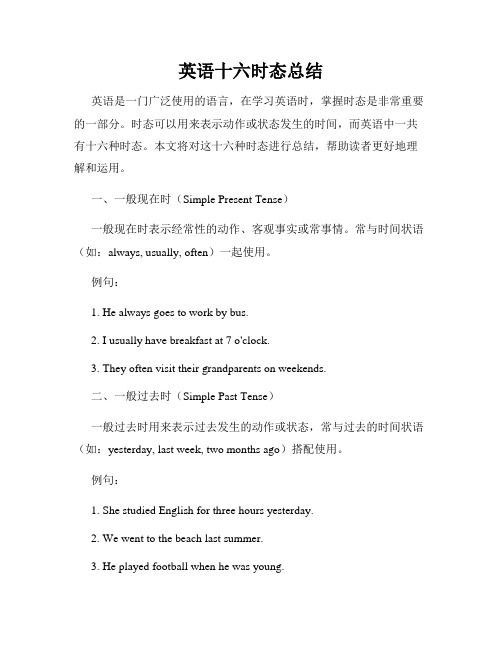
英语十六时态总结英语是一门广泛使用的语言,在学习英语时,掌握时态是非常重要的一部分。
时态可以用来表示动作或状态发生的时间,而英语中一共有十六种时态。
本文将对这十六种时态进行总结,帮助读者更好地理解和运用。
一、一般现在时(Simple Present Tense)一般现在时表示经常性的动作、客观事实或常事情。
常与时间状语(如:always, usually, often)一起使用。
例句:1. He always goes to work by bus.2. I usually have breakfast at 7 o'clock.3. They often visit their grandparents on weekends.二、一般过去时(Simple Past Tense)一般过去时用来表示过去发生的动作或状态,常与过去的时间状语(如:yesterday, last week, two months ago)搭配使用。
例句:1. She studied English for three hours yesterday.2. We went to the beach last summer.3. He played football when he was young.三、一般将来时(Simple Future Tense)一般将来时表示将来要发生的动作或状态,常与将来的时间状语(如:tomorrow, next week, in a month)一起使用。
也可使用助动词(will)来构成一般将来时。
例句:1. I will meet my friends tomorrow.2. They are going to travel to Europe next month.3. She will send you an email later.四、现在进行时(Present Continuous Tense)现在进行时用来表示现阶段正在进行的动作或状态,通常与现在进行时的标志词(如:now, at the moment)连用。
专升本英语语法:16种英语时态(用法+例句)
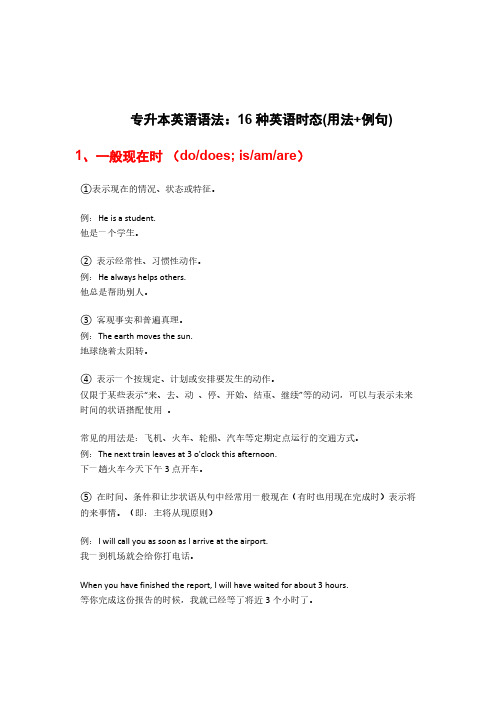
专升本英语语法:16种英语时态(用法+例句)1、一般现在时(do/does;is/am/are)①表示现在的情况、状态或特征。
例:He is a student.他是一个学生。
②表示经常性、习惯性动作。
例:He always helps others.他总是帮助别人。
③客观事实和普遍真理。
例:The earth moves the sun.地球绕着太阳转。
④表示一个按规定、计划或安排要发生的动作。
仅限于某些表示“来、去、动、停、开始、结束、继续”等的动词,可以与表示未来时间的状语搭配使用。
常见的用法是:飞机、火车、轮船、汽车等定期定点运行的交通方式。
例:The next train leaves at3o'clock this afternoon.下一趟火车今天下午3点开车。
⑤在时间、条件和让步状语从句中经常用一般现在(有时也用现在完成时)表示将的来事情。
(即:主将从现原则)例:I will call you as soon as I arrive at the airport.我一到机场就会给你打电话。
When you have finished the report,I will have waited for about3hours.等你完成这份报告的时候,我就已经等了将近3个小时了。
2、现在进行时(am/is/are doing)①表示此时此刻正在发生的事情。
例:He is listning to the music now.他现在正在听音乐。
②表示目前一段时间内一直在做的事情,但不一定此时此刻正在做。
例:I am studying computer this term.这个学期我一直在学习计算机。
③现在进行时可以表示将来的含义。
a.瞬时动词的进行一定表将来。
例:I am leaving.我要离开了。
b.持续动词的进行只有有将来的时间状语或有将来语境中才表将来。
例:I am travelling next month.下个月我要去旅行。
英语语法大全之16种时态的深入解析

英语语法大全之16种时态的深入解析1. 现在时 (Present Simple)- 主要用于表达惯性、普遍性的动作或状态。
- 结构:主语 + 动词原形 (+ 其他附加成分)。
- 例句:He watches TV every evening.2. 过去时 (Past Simple)- 主要用于过去发生的动作或状态。
- 结构:主语 + 动词过去式 (+ 其他附加成分)。
- 例句:She visited her grandparents last weekend.3. 将来时 (Future Simple)- 主要用于表示将来发生的动作或状态。
- 结构:主语 + will + 动词原形 (+ 其他附加成分)。
- 例句:They will go to the park tomorrow.4. 现在进行时 (Present Continuous)- 主要用于表示现在正在进行的动作。
- 结构:主语 + am/is/are + 现在分词 (+ 其他附加成分)。
- 例句:I am studying for the exam.5. 过去进行时 (Past Continuous)- 主要用于表示过去某个时间点正在进行的动作。
- 结构:主语 + was/were + 现在分词 (+ 其他附加成分)。
- 例句:She was sleeping when I arrived.6. 将来进行时 (Future Continuous)- 主要用于表示将来某个时间点正在进行的动作。
- 结构:主语 + will be + 现在分词 (+ 其他附加成分)。
- 例句:They will be working at the office tomorrow.7. 现在完成时 (Present Perfect)- 主要用于表示过去发生的动作对现在产生的影响。
- 结构:主语 + have/has + 过去分词 (+ 其他附加成分)。
- 例句:He has finished his homework.8. 过去完成时 (Past Perfect)- 主要用于表示过去某个时间点之前已经完成的动作。
英语16种时态详解

英语16种时态详解时态(Tense)是表示行为、动作和状态在各种时间条件下的动词形式。
因此,当我们说时态结构的时候,指的是相应时态下的动词形式。
英语时态分为16种:一般现在、一般过去、一般将来、过去将来时,以及这四者的进行时、完成时和完成进行时。
下面是16种时态的谓语动词形式和具体用法,高考必考的是前十个时态,同学们需要重点掌握。
1、一般现在时(do/does; is/am/are)①表示现在的情况、状态或特征。
例:He is a student.他是一个学生。
②表示经常性、习惯性动作。
例:He always helps others.他总是帮助别人。
③客观事实和普遍真理。
例:The earth moves the sun.地球绕着太阳转。
④表示一个按规定、计划或安排要发生的动作。
仅限于某些表示“来、去、动、停、开始、结束、继续”等的动词,可以与表示未来时间的状语搭配使用。
常见的用法是:飞机、火车、轮船、汽车等定期定点运行的交通方式。
例:The next train leaves at 3 o'clock this afternoon.下一趟火车今天下午3点开车。
⑤在时间、条件和让步状语从句中经常用一般现在(有时也用现在完成时)表示将的来事情。
(即:主将从现原则)例:I will call you as soon as I arrive at the airport.我一到机场就会给你打电话。
When you have finished the report, I will have waited for about 3 hours.等你完成这份报告的时候,我就已经等了将近3个小时了。
2、现在进行时(am/is/are doing)①表示此时此刻正在发生的事情。
例:He is listning to the music now.他现在正在听音乐。
②表示目前一段时间内一直在做的事情,但不一定此时此刻正在做。
16种时态及语态总结
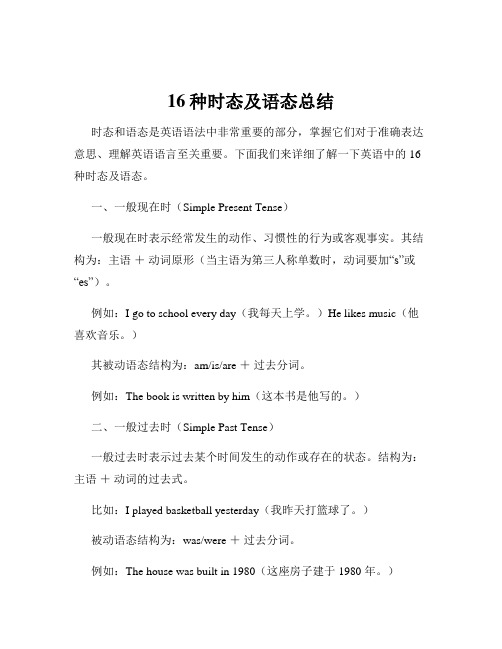
16种时态及语态总结时态和语态是英语语法中非常重要的部分,掌握它们对于准确表达意思、理解英语语言至关重要。
下面我们来详细了解一下英语中的 16 种时态及语态。
一、一般现在时(Simple Present Tense)一般现在时表示经常发生的动作、习惯性的行为或客观事实。
其结构为:主语+动词原形(当主语为第三人称单数时,动词要加“s”或“es”)。
例如:I go to school every day(我每天上学。
)He likes music(他喜欢音乐。
)其被动语态结构为:am/is/are +过去分词。
例如:The book is written by him(这本书是他写的。
)二、一般过去时(Simple Past Tense)一般过去时表示过去某个时间发生的动作或存在的状态。
结构为:主语+动词的过去式。
比如:I played basketball yesterday(我昨天打篮球了。
)被动语态结构为:was/were +过去分词。
例如:The house was built in 1980(这座房子建于 1980 年。
)三、一般将来时(Simple Future Tense)一般将来时表示将来要发生的动作或存在的状态。
结构有多种,常见的有:will +动词原形;be going to +动词原形。
例如:I will visit my grandparents next week(下周我将去看望我的祖父母。
)She is going to have a party(她打算举办一个聚会。
)其被动语态结构为:will be +过去分词;be going to be +过去分词。
比如:The meeting will be held tomorrow(会议将在明天举行。
)The show is going to be cancelled(这个演出将要被取消。
)四、现在进行时(Present Continuous Tense)现在进行时表示正在进行的动作。
16种英语时态总结归纳

16种英语时态总结归纳英语中有16种时态,每种时态有不同的用法和语法规则。
1. 现在时态:- 简单现在时:表示经常性或客观事实。
- 现在进行时:表示现在进行的动作。
- 现在完成时:表示过去某个时间开始,一直持续到现在的动作。
2. 过去时态:- 简单过去时:表示过去发生的动作或状态。
- 过去进行时:表示过去某个时间正在进行的动作。
- 过去完成时:表示过去某个时间之前已经完成的动作。
3. 将来时态:- 简单将来时:表示将来将发生的事情。
- 将来进行时:表示将来某个时间正在进行的动作。
- 将来完成时:表示将来某个时间之前已经完成的动作。
4. 过去将来时态:- 过去将来时:表示过去某个时间将要发生的动作。
5. 过去进行将来时态:- 过去进行将来时:表示过去某个时间正在进行,将来会继续进行的动作或状态。
6. 过去完成将来时态:- 过去完成将来时:表示过去某个时间之前将会完成的动作。
7. 现在完成进行时:表示过去某个时间开始,一直持续到现在,并可能会继续进行的动作。
8. 现在完成完成时:表示过去某个时间开始,一直持续到现在,并已经完成的动作。
9. 过去完成进行时:表示过去某个时间之前已经开始,一直持续到过去某个时间的动作。
10. 现在完成将来时:表示将来某个时间之前已经开始,一直持续到现在,并将会继续进行的动作。
11. 过去完成将来进行时:表示过去某个时间将要发生的,将会持续到一个将来某个时间的动作。
12. 过去完成将来完成时:表示过去某个时间将会完成的动作。
13. 不定式:表示动作的目的、愿望、命令等。
14. 进行不定式:表示正在进行的不定式动作。
15. 完成不定式:表示已经完成的不定式动作。
16. 进行完成不定式:表示将来要完成的不定式动作。
英语中的十六种时态
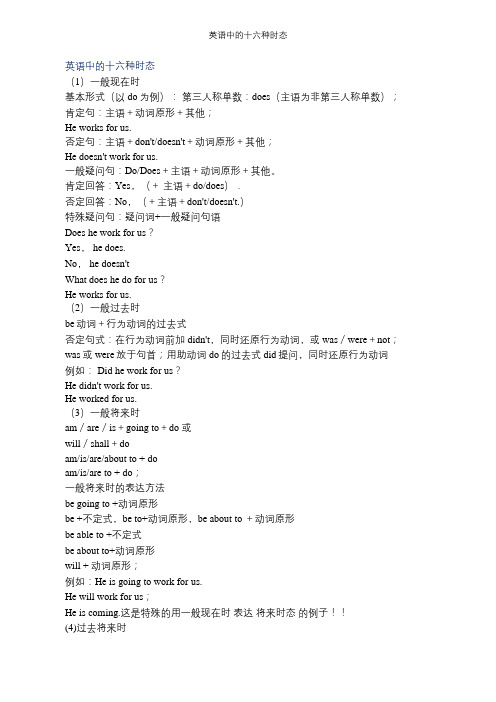
英语中的十六种时态(1)一般现在时基本形式(以do为例):第三人称单数:does(主语为非第三人称单数);肯定句:主语+动词原形+其他;He works for us.否定句:主语+don't/doesn't+动词原形+其他;He doesn't work for us.一般疑问句:Do/Does+主语+动词原形+其他。
肯定回答:Yes,(+主语+do/does).否定回答:No,(+主语+don't/doesn't.)特殊疑问句:疑问词+一般疑问句语Does he work for us?Yes, he does.No, he doesn'tWhat does he do for us?He works for us.(2)一般过去时be动词+行为动词的过去式否定句式:在行为动词前加didn't,同时还原行为动词,或was/were+not;was或were放于句首;用助动词do的过去式did提问,同时还原行为动词例如: Did he work for us?He didn't work for us.He worked for us.(3)一般将来时am/are/is+going to+do 或will/shall+doam/is/are/about to + doam/is/are to + do;一般将来时的表达方法be going to +动词原形be +不定式,be to+动词原形,be about to +动词原形be able to +不定式be about to+动词原形will + 动词原形;例如:He is going to work for us.He will work for us;He is coming.这是特殊的用一般现在时表达将来时态的例子!!(4)过去将来时be(was,were)going to+动词原形be(was,were)about to+动词原形be(was,were)to+动词原形肯定句:主语+be(was,were)going to+动词原形~.否定句:主语+be(was,were)not going to+动词原形~.疑问句:Be(Was,Were)+主语+going to+动词原形~?肯定句:主语+would(should)+动词原形~.否定句:主语+would(should)not+动词原形~.疑问句:Would(Should)+主语+动词原形~?He would work for us.(5)现在进行时主语+be+v.ing〔现在分词〕形式(其中v表示动词)表示现在正在进行的动作或最近在做的事。
英语16种时态讲解
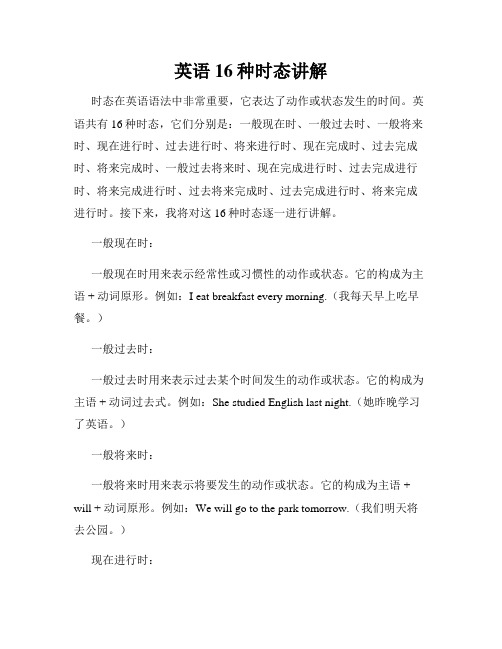
英语16种时态讲解时态在英语语法中非常重要,它表达了动作或状态发生的时间。
英语共有16种时态,它们分别是:一般现在时、一般过去时、一般将来时、现在进行时、过去进行时、将来进行时、现在完成时、过去完成时、将来完成时、一般过去将来时、现在完成进行时、过去完成进行时、将来完成进行时、过去将来完成时、过去完成进行时、将来完成进行时。
接下来,我将对这16种时态逐一进行讲解。
一般现在时:一般现在时用来表示经常性或习惯性的动作或状态。
它的构成为主语 + 动词原形。
例如:I eat breakfast every morning.(我每天早上吃早餐。
)一般过去时:一般过去时用来表示过去某个时间发生的动作或状态。
它的构成为主语 + 动词过去式。
例如:She studied English last night.(她昨晚学习了英语。
)一般将来时:一般将来时用来表示将要发生的动作或状态。
它的构成为主语 + will + 动词原形。
例如:We will go to the park tomorrow.(我们明天将去公园。
)现在进行时:现在进行时用来表示现在正在进行的动作。
它的构成为主语 +am/is/are + 动词-ing形式。
例如:He is watching TV now.(他正在看电视。
)过去进行时:过去进行时用来表示过去某个时间正在进行的动作。
它的构成为主语 + was/were + 动词-ing形式。
例如:They were playing soccer yesterday.(他们昨天正在踢足球。
)将来进行时:将来进行时用来表示将来某个时间正在进行的动作。
它的构成为主语 + will be + 动词-ing形式。
例如:I will be studying in the library tomorrow.(明天我将在图书馆学习。
)现在完成时:现在完成时用来表示过去发生但与现在有关的动作或状态。
它的构成为主语 + have/has + 动词过去分词。
英语语法--英语的16种时态
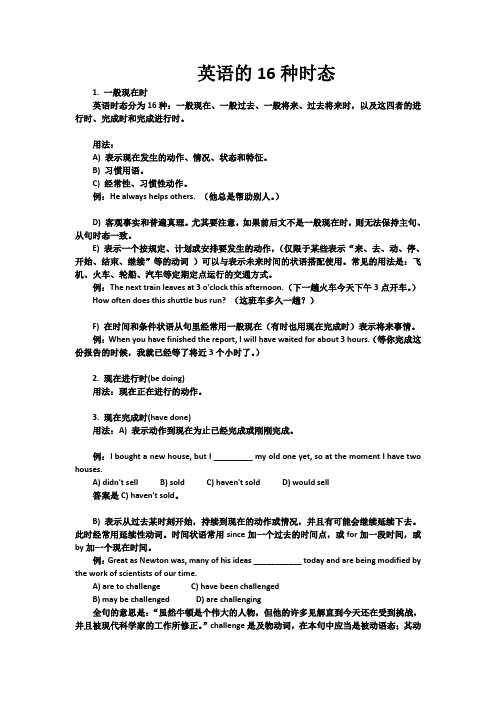
英语的16种时态1. 一般现在时英语时态分为16种:一般现在、一般过去、一般将来、过去将来时,以及这四者的进行时、完成时和完成进行时。
用法:A) 表示现在发生的动作、情况、状态和特征。
B) 习惯用语。
C) 经常性、习惯性动作。
例:He always helps others. (他总是帮助别人。
)D) 客观事实和普遍真理。
尤其要注意,如果前后文不是一般现在时,则无法保持主句、从句时态一致。
E) 表示一个按规定、计划或安排要发生的动作,(仅限于某些表示“来、去、动、停、开始、结束、继续”等的动词)可以与表示未来时间的状语搭配使用。
常见的用法是:飞机、火车、轮船、汽车等定期定点运行的交通方式。
例:The next train leaves at 3 o'clock this afternoon.(下一趟火车今天下午3点开车。
)How often does this shuttle bus run? (这班车多久一趟?)F) 在时间和条件状语从句里经常用一般现在(有时也用现在完成时)表示将来事情。
例:When you have finished the report, I will have waited for about 3 hours.(等你完成这份报告的时候,我就已经等了将近3个小时了。
)2. 现在进行时(be doing)用法:现在正在进行的动作。
3. 现在完成时(have done)用法:A) 表示动作到现在为止已经完成或刚刚完成。
例:I bought a new house, but I _________ my old one yet, so at the moment I have two houses.A) didn't sell B) sold C) haven't sold D) would sell答案是C) haven't sold。
B) 表示从过去某时刻开始,持续到现在的动作或情况,并且有可能会继续延续下去。
16种英语时态总结归纳
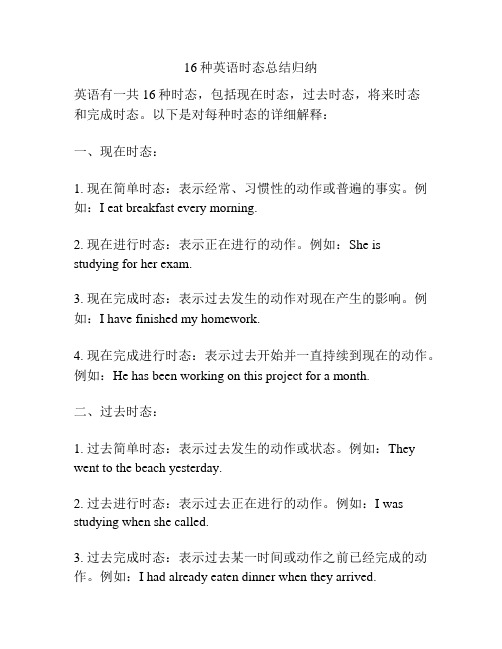
16种英语时态总结归纳英语有一共16种时态,包括现在时态,过去时态,将来时态和完成时态。
以下是对每种时态的详细解释:一、现在时态:1. 现在简单时态:表示经常、习惯性的动作或普遍的事实。
例如:I eat breakfast every morning.2. 现在进行时态:表示正在进行的动作。
例如:She is studying for her exam.3. 现在完成时态:表示过去发生的动作对现在产生的影响。
例如:I have finished my homework.4. 现在完成进行时态:表示过去开始并一直持续到现在的动作。
例如:He has been working on this project for a month.二、过去时态:1. 过去简单时态:表示过去发生的动作或状态。
例如:They went to the beach yesterday.2. 过去进行时态:表示过去正在进行的动作。
例如:I was studying when she called.3. 过去完成时态:表示过去某一时间或动作之前已经完成的动作。
例如:I had already eaten dinner when they arrived.4. 过去完成进行时态:表示过去某一时间之前开始并一直持续到该时间的动作。
例如:He had been working for 10 hours before he took a break.三、将来时态:1. 将来简单时态:表示将来会发生的动作或状态。
例如:We will go to the concert tomorrow.2. 将来进行时态:表示将来某一时间段将会发生的动作。
例如:I will be studying during the weekend.3. 将来完成时态:表示将来某一时间或动作之前已经完成的动作。
例如:By this time next year, they will have finished their project.4. 将来完成进行时态:表示将来某一时间之前开始并一直持续到该时间的动作。
16种英语时态总结归纳

16种英语时态总结归纳英语中有16种时态,每种时态都有不同的用法和含义。
下面是对这些时态进行总结和归纳。
一、一般现在时 (Simple Present)1. 表示经常性、习惯性动作:I go to school every day.2. 表示客观事实或普遍真理:The sun rises in the east.3. 表示常态情况:He likes chocolate.二、现在进行时 (Present Continuous)1. 表示正在进行的动作:I am studying English.2. 表示暂时的情况或计划:She is staying at a hotel until she finds an apartment.三、一般过去时 (Simple Past)1. 表示过去发生的动作:I visited my grandparents last weekend.2. 表示过去的经历:She studied in France for two years.四、过去进行时 (Past Continuous)1. 表示过去某一时刻正在进行的动作:They were watching a movie when I called.2. 表示过去同时发生的两个动作:I was cooking dinner while he was cleaning the house.五、一般将来时 (Simple Future)1. 表示将要发生的动作:I will meet you at the park tomorrow.2. 表示决定或打算:We are going to have a party next weekend.六、将来进行时 (Future Continuous)1. 表示将来某一时刻正在进行的动作:They will be traveling to Europe this time next year.2. 表示持续性的动作:I will be working late tonight.七、现在完成时 (Present Perfect)1. 表示过去发生但与现在有关的动作:I have finished my homework.2. 表示经历或经验:He has traveled to many countries.八、过去完成时 (Past Perfect)1. 表示在过去某一时刻之前已经完成的动作:They had already left when I arrived.2. 表示顺序:She had read the book before watching the movie.九、将来完成时 (Future Perfect)1. 表示将来某一时刻之前完成的动作:I will have finished my project by tomorrow.2. 表示结果:They will have arrived by the time we get there.十、现在完成进行时 (Present Perfect Continuous)1. 表示从过去某一时刻开始一直持续到现在的动作:I have been studying for three hours.2. 表示强调动作的持续性:He has been working all day.十一、过去完成进行时 (Past Perfect Continuous)1. 表示过去某一时刻之前一直持续到过去的动作:She had been waiting for two hours when the bus finally arrived.2. 表示强调动作的持续性:They had been playing tennis all afternoon.十二、将来完成进行时 (Future Perfect Continuous)1. 表示将来某一时刻之前持续进行的动作:I will have been studying for five hours by the time the exam starts.2. 表示强调动作的持续性:They will have been working on the project for a month.十三、虚拟现在时 (Present Unreal)1. 表示与现在事实相反的假设:If I were rich, I would buy a mansion.2. 表示建议或要求:I suggest that he study more.十四、虚拟过去时 (Past Unreal)1. 表示与过去事实相反的假设:If I had studied harder, I would have passed the exam.2. 表示遗憾或后悔:I wish I had bought that dress.十五、虚拟将来时 (Future Unreal)1. 表示与将来事实相反的假设:If I won the lottery, I would travel the world.2. 表示不可能实现的愿望:I wish she would become a famous singer.十六、过去将来时 (Future in the Past)1. 表示过去某一时刻之后将要发生的动作:He said he would call me later.2. 表示过去的计划:I thought we were going to have dinner together.以上是对16种英语时态的总结归纳。
十六种时态知识点总结
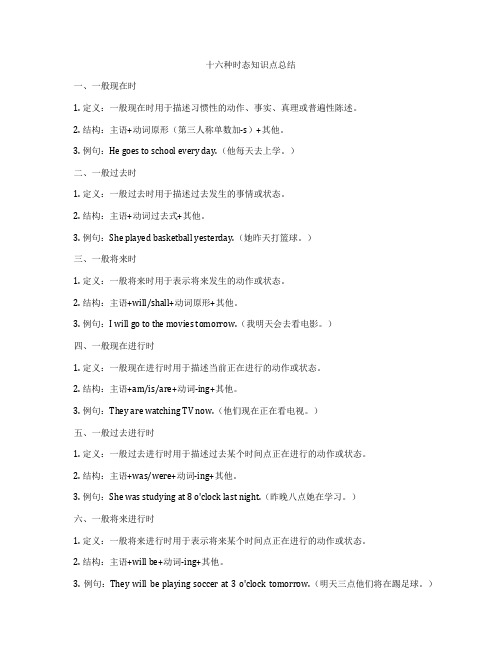
十六种时态知识点总结一、一般现在时1. 定义:一般现在时用于描述习惯性的动作、事实、真理或普遍性陈述。
2. 结构:主语+动词原形(第三人称单数加-s)+其他。
3. 例句:He goes to school every day.(他每天去上学。
)二、一般过去时1. 定义:一般过去时用于描述过去发生的事情或状态。
2. 结构:主语+动词过去式+其他。
3. 例句:She played basketball yesterday.(她昨天打篮球。
)三、一般将来时1. 定义:一般将来时用于表示将来发生的动作或状态。
2. 结构:主语+will/shall+动词原形+其他。
3. 例句:I will go to the movies tomorrow.(我明天会去看电影。
)四、一般现在进行时1. 定义:一般现在进行时用于描述当前正在进行的动作或状态。
2. 结构:主语+am/is/are+动词-ing+其他。
3. 例句:They are watching TV now.(他们现在正在看电视。
)五、一般过去进行时1. 定义:一般过去进行时用于描述过去某个时间点正在进行的动作或状态。
2. 结构:主语+was/were+动词-ing+其他。
3. 例句:She was studying at 8 o'clock last night.(昨晚八点她在学习。
)六、一般将来进行时1. 定义:一般将来进行时用于表示将来某个时间点正在进行的动作或状态。
2. 结构:主语+will be+动词-ing+其他。
3. 例句:They will be playing soccer at 3 o'clock tomorrow.(明天三点他们将在踢足球。
)七、一般现在完成时1. 定义:一般现在完成时用于描述过去发生的动作对当前的影响或结果。
2. 结构:主语+have/has+动词过去分词+其他。
3. 例句:She has finished her homework.(她已经完成了她的作业。
16种时态及语态总结
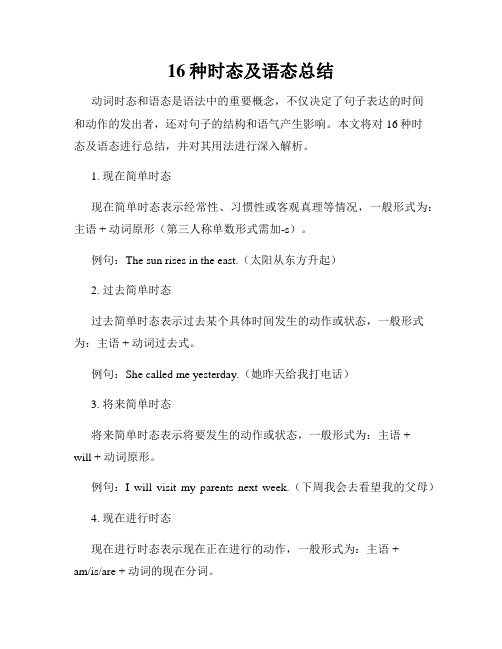
16种时态及语态总结动词时态和语态是语法中的重要概念,不仅决定了句子表达的时间和动作的发出者,还对句子的结构和语气产生影响。
本文将对16种时态及语态进行总结,并对其用法进行深入解析。
1. 现在简单时态现在简单时态表示经常性、习惯性或客观真理等情况,一般形式为:主语 + 动词原形(第三人称单数形式需加-s)。
例句:The sun rises in the east.(太阳从东方升起)2. 过去简单时态过去简单时态表示过去某个具体时间发生的动作或状态,一般形式为:主语 + 动词过去式。
例句:She called me yesterday.(她昨天给我打电话)3. 将来简单时态将来简单时态表示将要发生的动作或状态,一般形式为:主语 +will + 动词原形。
例句:I will visit my parents next week.(下周我会去看望我的父母)4. 现在进行时态现在进行时态表示现在正在进行的动作,一般形式为:主语 +am/is/are + 动词的现在分词。
例句:They are studying in the library now.(他们现在正在图书馆学习)5. 过去进行时态过去进行时态表示过去某一时刻正在进行的动作,一般形式为:主语 + was/were + 动词的现在分词。
例句:I was watching TV when he called me.(他给我打电话的时候,我正在看电视)6. 将来进行时态将来进行时态表示将来某一时刻正在进行的动作,一般形式为:主语 + will be + 动词的现在分词。
例句:She will be studying abroad this time next year.(明年这个时候她将在国外留学)7. 现在完成时态现在完成时态表示过去发生的动作对现在造成的影响或状态,一般形式为:主语 + have/has + 动词的过去分词。
例句:He has already finished his homework.(他已经完成了作业)8. 过去完成时态过去完成时态表示过去某个时间或动作发生之前已经完成的动作,一般形式为:主语 + had + 动词的过去分词。
英语语法16种时态总结

千里之行,始于足下。
英语语法16种时态总结英语语法有16种时态,包括简单现在时、一般过去时、一般将来时、过去进行时、现在进行时、将来进行时、现在完成时、过去完成时、将来完成时、一般过去将来时、过去完成将来时、现在完成进行时、过去完成进行时、将来完成进行时、将来进行进行时、将来完成进行进行时。
以下是每种时态的详细介绍。
1. 简单现在时(Simple Present Tense)这种时态表示经常性或习惯性的动作或状态。
例如:I go to school every day.(我每天去上学。
)2. 一般过去时(Simple Past Tense)这种时态表示过去发生的动作或状态。
例如:I visited my grandparents last weekend.(我上个周末去拜访了我的祖父母。
)3. 一般将来时(Simple Future Tense)这种时态表示将来要发生的动作或状态。
例如:I will go to the park tomorrow.(我明天要去公园。
)4. 过去进行时(Past Progressive Tense)这种时态表示过去某个时间正在进行中的动作或状态。
例如:They were playing tennis yesterday afternoon.(他们昨天下午正在打网球。
)5. 现在进行时(Present Progressive Tense)这种时态表示现在正在进行的动作或状态。
例如:She is reading a book now.(她现在正在看书。
)第1页/共3页锲而不舍,金石可镂。
6. 将来进行时(Future Progressive Tense)这种时态表示将来某个时间正在进行中的动作或状态。
例如:We will be having dinner at 7 o'clock tomorrow.(明天晚上7点我们将正在吃晚餐。
)7. 现在完成时(Present Perfect Tense)这种时态表示过去发生的动作对现在产生的影响或结果。
16种时态及语态总结计划

16种时态及语态总结计划在英语学习中,时态和语态是非常重要的语法知识点。
掌握好时态和语态,能够让我们更准确、清晰地表达自己的意思。
下面就为大家详细总结一下 16 种时态及语态。
一、一般时态1、一般现在时一般现在时表示经常发生的动作、习惯性的动作或者客观存在的事实。
结构:主语+动词原形(当主语是第三人称单数时,动词要加 s 或 es)例如:I play football every weekend (我每个周末踢足球。
)He likes reading books (他喜欢读书。
)2、一般过去时一般过去时表示过去发生的动作或存在的状态。
结构:主语+动词的过去式例如:I went to Beijing last year (我去年去了北京。
)We had a great time at the party (我们在聚会上玩得很开心。
)3、一般将来时一般将来时表示将来要发生的动作或存在的状态。
结构:主语+ will +动词原形或者主语+ be going to +动词原形例如:I will visit my grandparents next week (我下周要去看望我的祖父母。
)She is going to study abroad next year (她明年要出国留学。
)二、进行时态1、现在进行时现在进行时表示现在正在进行的动作。
结构:主语+ am/is/are +现在分词例如:I am watching TV now (我现在正在看电视。
)They are playing basketball in the playground (他们正在操场上打篮球。
)2、过去进行时过去进行时表示过去某个时刻正在进行的动作。
结构:主语+ was/were +现在分词例如:I was doing my homework at eight o'clock last night (昨晚八点我正在做作业。
英语语法大全之16种时态规则

英语语法大全之16种时态规则一、一般现在时(Simple Present Tense)1. 表示经常性或普遍性的动作、状态或喜好。
例:He eats breakfast every day.(他每天吃早餐。
)例:I like watching movies.(我喜欢看电影。
)二、现在进行时(Present Continuous Tense)1. 表示现在正在进行的动作。
例:She is studying in the library.(她正在图书馆研究。
)例:They are playing soccer in the park.(他们正在公园踢足球。
)三、一般过去时(Simple Past Tense)1. 表示过去发生的动作或状态。
例:I went to the party last night.(我昨晚去了派对。
)例:She studied English in college.(她在大学里研究英语。
)四、过去进行时(Past Continuous Tense)1. 表示过去某一时间正在进行的动作。
例:I was watching TV when she called.(她打电话时,我正在看电视。
)例:They were playing basketball yesterday afternoon.(昨天下午他们在打篮球。
)五、一般将来时(Simple Future Tense)1. 表示将来某个时间要发生的动作或状态。
例:We will have a meeting tomorrow.(我们明天有一个会议。
)例:He will visit his grandparents next week.(下周他会去探望他的祖父母。
)六、将来进行时(Future Continuous Tense)1. 表示将来某一时间将在进行的动作。
例:I will be working on my project this time next week.(下星期的这个时候我将会在做我的项目。
英语16种时态讲解

英语共有16 种时态,分别是:一般现在时、一般过去时、一般将来时、过去将来时、现在进行时、过去进行时、将来进行时、现在完成时、过去完成时、将来完成时、现在完成进行时、过去完成进行时、将来完成进行时、过去将来进行时、过去将来完成时、过去将来完成进行时。
以下是对其中一些常见时态的讲解:1.一般现在时:表示现在的状态、经常发生的动作或客观事实。
•构成:主语+ 动词原形(第三人称单数时,动词需加-s 或-es)•例句:I study English every day.1.一般过去时:表示过去发生的动作或状态。
•构成:主语+ 动词过去式•例句:She went to the park yesterday.1.一般将来时:表示将来要发生的动作或状态。
•构成:主语+ will/shall + 动词原形•例句:We will have a party next week.1.现在进行时:表示正在进行的动作。
•构成:主语+ am/is/are + 现在分词•例句:He is watching TV now.1.过去进行时:表示过去某个时刻正在进行的动作。
•构成:主语+ was/were + 现在分词•例句:They were playing football at four o'clock yesterday afternoon.1.现在完成时:表示过去发生的动作对现在造成的影响或结果,或者表示从过去开始一直持续到现在的动作或状态。
•构成:主语+ have/has + 过去分词•例句:I have finished my homework.1.过去完成时:表示在过去某个时间之前已经完成的动作。
•构成:主语+ had + 过去分词•例句:By the end of last month, she had learned 2,000 words.以上只是对一些常见时态的简要介绍,每种时态都有其特定的用法和表达方式。
- 1、下载文档前请自行甄别文档内容的完整性,平台不提供额外的编辑、内容补充、找答案等附加服务。
- 2、"仅部分预览"的文档,不可在线预览部分如存在完整性等问题,可反馈申请退款(可完整预览的文档不适用该条件!)。
- 3、如文档侵犯您的权益,请联系客服反馈,我们会尽快为您处理(人工客服工作时间:9:00-18:30)。
一般现在时1.表示现在习惯或经常反复发生的动作。
常与always, usually, often, sometimes, every day (week, month)等连用。
He plays football twice a week.他每周踢两次足球。
I sometimes go to work on foot.我有时步行去上班。
2.表示现在的事实或状态。
It’s cold today.今天很冷。
You look tired now.你现在看起来很疲乏。
3. 现在时刻的状态、能力、性格、个性。
I don't want so much.Ann Wang writes good English but does not speak well.比较:Now I put the sugar in the cup.I am doing my homework now.第一句用一般现在时,用于操作演示或指导说明的示范性动作,表示言行的瞬间动作。
再如:Now watch me, I switch on the current and stand back. 第二句中的now是进行时的标志,表示正在进行的动作的客观状况,所以后句用一般现在时。
4.表示格言或警句中。
Pride goes before a fall.骄者必败。
注意:此用法如果出现在宾语从句中,即使主句是过去时,从句谓语也要用一般现在时。
例:Columbus proved that the earth is round..5.表示客观事实或普遍其理。
It’s far from the earth to the sun.地球与太阳间的距离很远。
Five and three makes eight.五加三得八。
5.表示已预先安排或计划好将来确定会发生的动作。
但主要用于go, come, leave, start, return, arrive等瞬间动词。
The train from London arrives at 7:00.从伦敦来的火车7:00到站。
He leaves on business the day after tomorrow.他后天出差。
6.在时间、让步及条件状语从句中表示将来的动作。
I’ll call you as soon as I get there.我一到那里就打电话给你。
I’ll come if he invites me.他如果邀请我我就来。
7.在以here, there开头的句子里,表示正在发生的动作。
Her comes the bus!汽车来了!There goes the bell!铃响了!当主语是代词时,代词必须放在动词之前。
如:There he comes!他来了!8.某些表示心理状态和感觉的动词,如feel, love, hope, want, understand等表示现在发生的具体行为。
I feel pain in my head.我头疼。
I don’t understand what you mean.我不理解你的意思。
此时只用一般现在时而不用现在进行时。
9在由after,until,before,once,when,even if,in case,as long as,as soon as,the moment 以及if,unless等引导的时间状语从句或条件状语从句中,通常用一般现在时代替将来时。
例如:1)I will tell him the news as soon as I see him.2)I will not go to countryside if it rains tomorrow.10某些表示起始的动词,可用一般现在时表示按规定、计划或安排要发生的动作,这类动词有:be,go,come,start,depart,arrive,begin,leave等。
例如:1)The plane leaves at three sharp.2)The new teachers arrive tomorrow.11在由why,what,where,whoever,who,that,as等引导的从句中,也常用一般现在时代替将来时。
例如:1)Free tickets will be given to whoever comes first.2)You’ll probably be in the same train as I am tomorrow.12一般现在时用于倒装句中可以表示正在发生的动作,动词以come, go为主。
如:Here comes the bus. (车来了) / There goes the bell.(铃响了)。
13一般现在时常用于体育比赛的解说或寓言故事中。
Now the midfield player catches the ball and he keeps it.14一般现在时的特殊用法a. 用于新闻标题或图片说明中China Declares Manned Spaceflight Successful中国宣布载人航天飞行圆满成功Laura Bush Arrives in Moscow劳拉·布什抵达莫斯科b. 用于体育运动、表演等实况报道中Francis slips past, passes the ball to Yao Ming, who jumps, catches and shoots it into the basket.弗朗西斯穿过去,把球传给姚明,姚明跳起来,接住球投进篮里。
Now, look, I press the button and turn on the machine.现在,看,我按下按扭,打开了这台机器。
c. 表示告诫或劝说You mind your own business.你不要管闲事!If he does that again, he goes to prison.如果他再那样的话,他就会进监狱的。
d. 表示现在瞬间的动作Here comes the bus.汽车来了。
There goes the bell.铃响了。
一般过去时1.表示过去发生的动作或存在的状态,常与表示过去时间的副词如:yesterday, last week, two hours ago 等连用。
My family moved here five years ago.我家五年前搬到了这里。
I was born in 1973.我生于1973年。
2.表示过去一段时间经常或反复发生的动作。
这时可与频度副词如:often, usually, always等连用。
He always worked into night those days.那些日子他总是工作到深夜。
I often left on business in 1987.1987年我经常出差。
表示“过去经常,而今不再”时,要用used to。
如:I used to read newspaper after breakfast.我过去经常早饭后看报纸。
(意指现在已不是这样)The children often swam in this river. 孩子们过去经常在这条河里游泳。
3.表示过去连续发生的一连串动作。
He put down the heavy box, took out the keys, and opened the door.他放下这沉重的箱子,掏出钥匙开了房门。
过去发生的一连串动作,若用and, or, but等并列连词连接,则一律用过去式。
They moved the chairs to the table, sat down and began to have supper.他们把椅子搬到桌边,坐下开始吃饭。
4.在时间和条件状语从句中,用一般过去时表示过去将来的动作。
He said that he would let me know as soon as he got the information.他说他一得到消息就立即让我知道。
Mary told me that she would stay at home if it rained.玛丽告诉我如果下雨她就呆在家里。
5表示过去某一特定时间所发生的、可完成的动作或状态,常与表示确切过去时间的词、短语或从句连用。
例如:We went to the pictures last night and saw a very interesting film.6表示过去习惯性动作。
例如:1)He always went to class last.2)I used to do my homework in the library.(注意与be used to doing短语的区别)7,讲故事、对过去经历的回忆、双方都明白的过去事件等一般用过去时,而且经常省略时间状语。
如:I happened to meet Rose in the street.(我正好在街上遇到露西)8一般过去时的特殊用法a. 在虚拟语气中表示现在或将来时间的动作或状态It's time we went.是我们该走的时候了。
I wish I were twenty years younger.但愿我年轻20岁。
I would rather you didn't do anything for the time being.我宁愿你暂时先不要采取什么措施。
b. 在口语中,一般过去时往往显示委婉客气。
I wondered if you could give me a hand.我想请你帮个忙。
Might I come and see you tonight?我想今晚来看你,好吗?9句型:It is time for sb. to do sth"到……时间了""该……了"It is time sb. did sth. "时间已迟了""早该……了"It is time for you to go to bed.你该睡觉了。
It is time you went to bed.你早该睡觉了。
would (had) rather sb. did sth.表示'宁愿某人做某事'I'd rather you came tomorrow.10 wish, wonder, think, hope 等用过去时,作试探性的询问、请求、建议等。
I thought you might have some. 我以为你想要一些。
